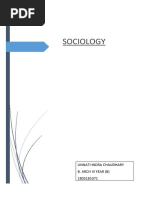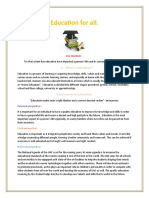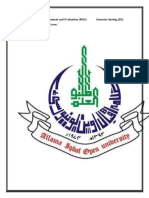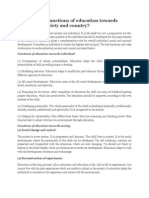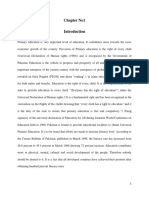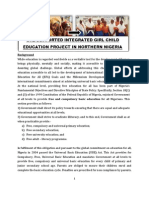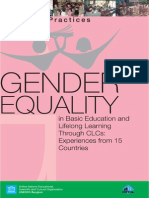0 ratings0% found this document useful (0 votes)
37 viewsSangat Sindh Report On Education For All by 2015
Sangat Sindh Report On Education For All by 2015
Uploaded by
javedkk83This document summarizes a seminar on education for all by 2015 that was held in Mirzapur, Nawabshah.
The seminar discussed the challenges facing Pakistan in achieving universal primary education by 2015 as committed globally. Speakers highlighted that rural education is in poor condition, with low literacy rates, teacher absenteeism, and a lack of facilities. The curriculum was also noted as outdated and irrelevant. Seminar objectives included raising awareness of education's role in development and discussing stakeholders' responsibilities. Recommendations focused on adopting a uniform education strategy and prioritizing rural education to achieve the committed goal of education for all.
Copyright:
Attribution Non-Commercial (BY-NC)
Available Formats
Download as PDF, TXT or read online from Scribd
Sangat Sindh Report On Education For All by 2015
Sangat Sindh Report On Education For All by 2015
Uploaded by
javedkk830 ratings0% found this document useful (0 votes)
37 views12 pagesThis document summarizes a seminar on education for all by 2015 that was held in Mirzapur, Nawabshah.
The seminar discussed the challenges facing Pakistan in achieving universal primary education by 2015 as committed globally. Speakers highlighted that rural education is in poor condition, with low literacy rates, teacher absenteeism, and a lack of facilities. The curriculum was also noted as outdated and irrelevant. Seminar objectives included raising awareness of education's role in development and discussing stakeholders' responsibilities. Recommendations focused on adopting a uniform education strategy and prioritizing rural education to achieve the committed goal of education for all.
Original Title
Sangat Sindh Report on Education for All by 2015
Copyright
© Attribution Non-Commercial (BY-NC)
Available Formats
PDF, TXT or read online from Scribd
Share this document
Did you find this document useful?
Is this content inappropriate?
This document summarizes a seminar on education for all by 2015 that was held in Mirzapur, Nawabshah.
The seminar discussed the challenges facing Pakistan in achieving universal primary education by 2015 as committed globally. Speakers highlighted that rural education is in poor condition, with low literacy rates, teacher absenteeism, and a lack of facilities. The curriculum was also noted as outdated and irrelevant. Seminar objectives included raising awareness of education's role in development and discussing stakeholders' responsibilities. Recommendations focused on adopting a uniform education strategy and prioritizing rural education to achieve the committed goal of education for all.
Copyright:
Attribution Non-Commercial (BY-NC)
Available Formats
Download as PDF, TXT or read online from Scribd
Download as pdf or txt
0 ratings0% found this document useful (0 votes)
37 views12 pagesSangat Sindh Report On Education For All by 2015
Sangat Sindh Report On Education For All by 2015
Uploaded by
javedkk83This document summarizes a seminar on education for all by 2015 that was held in Mirzapur, Nawabshah.
The seminar discussed the challenges facing Pakistan in achieving universal primary education by 2015 as committed globally. Speakers highlighted that rural education is in poor condition, with low literacy rates, teacher absenteeism, and a lack of facilities. The curriculum was also noted as outdated and irrelevant. Seminar objectives included raising awareness of education's role in development and discussing stakeholders' responsibilities. Recommendations focused on adopting a uniform education strategy and prioritizing rural education to achieve the committed goal of education for all.
Copyright:
Attribution Non-Commercial (BY-NC)
Available Formats
Download as PDF, TXT or read online from Scribd
Download as pdf or txt
You are on page 1of 12
Education For All By 2015: The Challenges
April 28, 2007
Mirzapur, Nawabshah
Seminar Report
By
Nisar Brohi
Seminar Report: Education For All By 2015: The Challenges
r Repot: Education For All By 2015: The Challenges
1. An Introduction
2. Objectives of the Seminar
3. Seminar Proceedings
3.1 Mr. Nek Soomro, Welcome Address
3.2 Mr. Nisar Brohi, Director, SDF
3.3 Mr. Abdul Hameed, DDO Education,
3.4 Mr. Zulfiqar Ali, Branch Manager, SRSP,
Nawabshah
3.4 Mr. Nawaz Brohi, Eminent Journalist
3.5 Mr. Qurban Brohi, lecturer Rangers Public
School, Nawabshah
3.6 Mr. Nazir A. Zardari, Vote of thanks
4. Recommendations of the Seminar
Seminar Report: Education For All By 2015: The Challenges
r Repot: Education For All By 2015: The Challenges
1. An Introduction
Education is the basic right of every individual;
therefore, easy access to education for every
citizen should be ensured, it is an evitable for
the human resources development and ultimately for
socio-economic
development of
the nation.
However,
according to
government
figures, in
2001-2002, the
over all
estimated
literacy rate
in the country
was 50.5
percent, for male 63 percent and for female 38
percent. The rural literacy rate was 30 percent and
urban literacy rate was 70 percent. But there are
still millions of children are out of schools. The
figures reveal that there are about 6 million
children of 5-9-age group who are left out of
school. The left out includes those children who
never enrolled and those who drop out.
There are a lot of discouraging elements exist in
education system of the country, which created
hindrances for the poor masses to get their
children admitted in the schools, such as the low
literacy rate, high drop out rate, a large scale
teacher absenteeism, weak and poor management and
supervision structure of our educational
departments, dearth of trained and qualified
teachers, lack of dedication, motivation and
interest in their teaching profession and shortage
of physical facilities in the schools especially in
the rural areas. Moreover the curriculum is mostly
Seminar Report: Education For All By 2015: The Challenges
r Repot: Education For All By 2015: The Challenges
outdated, irrelevant and does not meet the
contemporary challenges.
Education for All (EFA)
Education For All refers to the world wide
commitment for the universal primary education
completion of all children by 2015 all over the
world.
This global commitment was made at the World
Education Forum in Dakar, Senegal in April 2000 and
later on reaffirmed in the Millennium declaration
in New York
in September
2000. But
the
Government
of Pakistan
seems to be
lagging
behind in
achieving
the
committed
goal by
2015, if she
would not chalk out uniform strategy for the
promotion of universal education in the country,
especially focusing on the backward and rural
areas, where there is very low education ratio due
to lack of educational facilities to the rural
community.
2. Objectives of the Seminar
To join the Global Action Week from April-23-
28, 2007, education for all by 2015,
To get realized the government for its global
commitments for the promotion and illumination
of universal primary education completion by
2015,
Seminar Report: Education For All By 2015: The Challenges
r Repot: Education For All By 2015: The Challenges
To discuss the importance of education for the
socio-economic development,
To highlight the flaws in the education
structure in the country,
To discuss the role of the local stakeholders,
including the local government and elected
representatives for the promotion of education,
To sensitize the rural community to play their
due role for the education promotion in their
respective rural areas
3. Seminar Proceedings
3.1 Mr. Nek Soomro, Welcome Address
Mr. Soomro welcomed to all the participants and
offered his gratitude’s to SDF holding seminar on
the importance of education on the eve of Global
Action Week, education for all at Mirzapur,
Nawabshah.
While highlighting the current education scenario
in the district said that the majority of people
are uneducated in the area. They have still been
confronting with various problems in accessing
education for their new generation. A large number
of schools in
the area either
closed since
long time or the
teachers are
reluctant to
attend the
schools.
He further said,
education is the
most ignored
social sector in
the district, neither the local administration has
any education promotion policy nor the provincial
government has taken any serious and fruitful
Seminar Report: Education For All By 2015: The Challenges
r Repot: Education For All By 2015: The Challenges
efforts for the effective and result-oriented
functioning of the rural schools in the district.
Therefore, education of the district especially in
the rural areas is in pathetic and deterioration
condition.
3.2 Mr. Nisar Brohi, Director, SDF
While speaking in the seminar Mr. Brohi said that
SDF is for non-profit and non-governmental
organization, working closely with civil society
stakeholders on socio-economic and human rights
awareness issues. The education awareness of the
rural masses is also one of the main thematic areas
of the organization; therefore, the Sangat
organization has been busy in developing close
coordination and collaboration with local public
and private organizations as well as national
organizations for the promotion of education in the
district.
He further talking on the topic “Education and
Development” said, it is now universal fact that
without education no nation could achieve the
socio-economic development, because education is
the basic and founding element for the human
resource development, which ultimately leads to
socio-economic development of any society.
When we take stock of the developed nations,
education has had a vital role in their socio-
economic and political clout and development. On
the other side, the developing countries are
lacking behind in all fields of life just due to
lack of education of their people.
History reveals that those nations held sway over
others, which first focused on the education and
skill development of their people. But in the
contemporary world, education is an inevitable for
the survival and development of any nation. Without
it, no nation could pave its way for the prosperity
and development.
Seminar Report: Education For All By 2015: The Challenges
r Repot: Education For All By 2015: The Challenges
Education merely not helps us to understand the
latest trends around the globe, but also a way to
get rid of socio-intellectual poverty. Education
and development are inseparable elements. Education
helps the people to understand the new development
paradigm-taking place around the globe. The
government and civil society should come forward
to play their due role for the illumination of
education in our rural society, to bring them at a
par with other people and reduce their
powerlessness and depression.
3.3 Mr. Abdul Hameed, DDO Education, Govt of
Pakistan
While delivering his thought provoking presentation
on “Education and Curriculum flaws”, said that
education has never been on the first priority of
all the rulers of the country for the last six
decades, which has today brought us socio-political
upheaval. If we would not taken immediate bold and
valiant efforts for the promotion of equally
standardized and universal education in the
country, we would be leading ourselves to social
holocaust. The double standards in our education
system has alarmingly widen the gulf of haves and
haves not. Our society has clearly divided into two
classes, one highly rich and other extremely poor,
and the poor community is desperately fighting for
their survival.
This entire problem lies in the lack of education
facilities and curriculum developed by the
government, for the rich class, is separate and
standardized curriculum and for the poor and
backward class is other. It would not be an
exaggeration to say that the elite class is being
trained that how to hold sway over the under
privileged and marginalized class and the poor one
is either left illiterate or given low level
Seminar Report: Education For All By 2015: The Challenges
r Repot: Education For All By 2015: The Challenges
education just be able to understand the obey
orders of their bosses.
He lashed out at the ruling class to change their
bent of mind and conventional approaches in dealing
with the affairs of the state, and now adopt
unilateral approach handling the problems of the
people, the country can only be safe and secure
when the over all business of the state should be
based on social equality and justice. All the
subjects of the state should be treated
irrespectively. The education is the basic right of
all masses; it is therefore, the government should
take urgent measures for the universalization of
education in the country.
There should be a uniform educational policy in the
country, and the curriculum should be adopted
keeping in mind the contemporary global development
trends, and as well as protecting the local and
national values and traditions. It has been noted
that during the last couple of years the mother
languages are largely discouraged in our
educational institutions, which resulted into
large-scale drop out rate of the students. So, that
trend should be reversed in order to control the
drop out ratio which happens due to language
problem in the early years of children in the
schools.
3.4 Mr. Zulfiqar Ali, Branch Manager, SRSP,
Nawabshah
Mr. Zulfiqar talked on the topic “Education and
Gender Equality” he said that gender equality has
not been maintained in our educational
institutions. The government also seems reluctant
to make any serious efforts to develop the gender-
based approach in the educational institutions. Due
to indifferent attitude of government as well as
the civil society, today we have a very low ratio
of educated women in the country. Our education
Seminar Report: Education For All By 2015: The Challenges
r Repot: Education For All By 2015: The Challenges
system/institutions have very discouraging elements
and unfavorable environment for the girls to have
education freely.
Due to unawareness and illiteracy, our female class
has been facing with multidimensional problems in
the society. They have been marginalized from our
joint social set up. They are confined in the
houses just bearing babies and performing the
duties in their houses. As for as their education
and awareness issues are concerned, they are
deliberately kept away by their respective male
members. Simultaneously, the previous governments
have never designed women oriented policies, which
would have help them in getting education freely
and join the social development sphere.
It is now high time that the government and the
civil society stakeholders should come forward to
collectively and collaboratively make sustained
efforts for developing gender equality approaches
in socio-economic polices of the country, and to
ensure the women participation in the decision
making process. Unless and until, the women
community would not be involved in the over all
planning and policy designing cycle, the country
could not achieve any development and progress in
any field of life. Let us get participation of our
women population in the mainstream of our society
and provide them equal social status in the
society.
3.4 Mr. Nawaz Brohi, Eminent Journalist
While delivering his presentation on “Education and
Role of Local Government” said that education is
the key to all developments in the life. It is
therefore, education has been top priority of
developed nations in the world. But alas, our
governments have never taken any tangible efforts
for the promotion of education in the country. Due
to lack of education, we are having
Seminar Report: Education For All By 2015: The Challenges
r Repot: Education For All By 2015: The Challenges
multidimensional socio-economic and political
problems in the country. There were high public
expectations that with the establishment of local
government system in the county, would reduce the
problems of the poor and backward segment of the
society at the grass root level and would also
involve the powerless in the decision making
process at the local level, but all in vain. This
so called local government system has once again
introduced the local elite class, who has been
making all possible efforts to hold the local power
and keep the poor masses away from the power cadre.
As for the local government’s role for the
promotion of education is concerned, it is very
disappointing. There have been no changes in the
socio-educational landscape at the local level. The
local government administration has taken no
healthy efforts for the education promotion in
their respective areas. There are a large number of
schools are either closed or dysfunctional, but the
local government has a lot of excuses to make them
functional. A great numbers of school teachers are
regularly remaining absent from their duties and
used to sit and serve the interests of the local
Nazim and Naib Nazim, in order to get protection
from any expected punitive action.
The Nazims should have to play their due role for
the promotion and illumination of the education in
their respective local areas. They should make the
teachers bound for their duties, above board from
their political affiliations as to save the future
of the nation.
With this, the local elected representatives have
to change and replace the poor and ineffective
education management, which is the root cause for
the deterioration of education in the country. Due
to the appointment of corrupt and inefficient
officers in the education departments has brought
the education at brink of collapse. So, the time is
Seminar Report: Education For All By 2015: The Challenges
r Repot: Education For All By 2015: The Challenges
calling for shots in order to bring the education
of the country on the track, other wise we would
have a lot of sufferings and miseries if we would
not take corrective measures for the betterment of
our education system.
3.5 Mr. Qurban Brohi, Lecturer, Rangers Public
School, Nawabshah,
While speaking on the topic “Our Education System
and Role of Teacher” Mr. Qurban said that the
educational professionals have a paramount
important role in the promotion of education. They
are the nation-building actors of the society. It
would not be an exaggeration to say that the
teachers have had a decisive role for any change in
any society; they are the change agents of the
nation. But on the other side, it is the great
dilemma that the most sacred profession has been
systematically made inefficient and corrupts in our
country.
He recalled that during the 90s decade, a large
numbers of so-called teachers were recruited in
public educational department, which was the sowing
of seeds for the destruction and deterioration of
education in the country. Due to slaughtering of
merit culture by our so-called democratic
governments in the appointments of the teachers has
played havoc with the education system, and
ultimately brought many problems for the society.
He recommended that either this so called
inefficient army of teachers should be fired or
given trainings for their capacity building, and
after that trainings and education they should also
be made bound to pass the proposed test/examination
for their service continuity in the education
department, if they failed they should be either
fired or send to other departments, but don’t let
them to play the future of the nation. He also
appealed to teaching professional to make hard work
Seminar Report: Education For All By 2015: The Challenges
r Repot: Education For All By 2015: The Challenges
for their capacity and skill development, than they
could build the future of nation.
3.6 Mr. Nazir A. Zardari, Vote of Thanks
In the conclusion of the seminar, Mr. Nazir Zardari
presented the vote of thanks, and said that it is
onus and responsibility of all stakeholders of the
society to work collectively for the education
awareness in the society, in order to have better
socio-economic future of the nation. He suggested
establishment of Union, Taluka and district level
education watch groups consisted upon
representatives of all stakeholders of civil
society and the civil society group should work
very closely with the local elected and educational
department for the betterment of education
especially in the rural areas of the district.
3. Recommendations of the Seminar
♦ There is badly need of awareness campaign
regarding the importance of education in the
rural community
♦ The all stakeholders should be provided massive
capacity building training in order to ensure
better performance and understanding of their
roles and responsibilities.
♦ The communities should be sensitize and given
proper orientation, as to play their role in the
enhancement of education levels and standards.
♦ The physical infrastructure isn’t properly in
place yet, there, the creation of proper
infrastructure is critically important.
♦ The monitoring staff needs to be made mobile to
ensure effective functioning
♦ The public representatives should refrain from
unnecessary interference and political clout over
education officials.
♦ A number of managerial staff is from teaching
cadres. They should be provided with necessary
managerial training
Seminar Report: Education For All By 2015: The Challenges
r Repot: Education For All By 2015: The Challenges
You might also like
- Problems of Education in India and Their SolutionsDocument43 pagesProblems of Education in India and Their SolutionsDr. Nisanth.P.M100% (9)
- Child Education Awareness ProjectDocument7 pagesChild Education Awareness ProjectVarun NaniNo ratings yet
- Project On EducationDocument30 pagesProject On EducationNitish KumarNo ratings yet
- Oslo Institute For Modern Languages: Essay On EducationDocument5 pagesOslo Institute For Modern Languages: Essay On EducationhassanNo ratings yet
- IlliteracyDocument9 pagesIlliteracyAbdullah SheikhNo ratings yet
- Education To All by 2010 A Hit or A MythDocument5 pagesEducation To All by 2010 A Hit or A MythAbhishekNo ratings yet
- Problems of Education in India and Their SolutionsDocument43 pagesProblems of Education in India and Their SolutionsDr. Nisanth.P.M100% (2)
- Education Essay 6 (400 Words)Document1 pageEducation Essay 6 (400 Words)Nirosshnie MaganthiranNo ratings yet
- Strategiepapier320 01 2012 PDFDocument18 pagesStrategiepapier320 01 2012 PDFJill arnaizNo ratings yet
- EHAOXOXDocument22 pagesEHAOXOX7C52VedantRajNo ratings yet
- Essay On Illiteracy in PakistanDocument9 pagesEssay On Illiteracy in Pakistanayaz mahmood40% (5)
- Essay DanishDocument3 pagesEssay DanishDanishNo ratings yet
- Project 2Document5 pagesProject 2Raam Deuba100% (1)
- To Evaluate The Effectiveness of The NFE Program For Non-School Goers in NavsrishtiDocument69 pagesTo Evaluate The Effectiveness of The NFE Program For Non-School Goers in NavsrishtiabdulraufrahmanNo ratings yet
- Over Eight Educational Policies Were Announced SincDocument4 pagesOver Eight Educational Policies Were Announced Sincstudentcare mtnNo ratings yet
- DVA 1502 Assignment 1Document7 pagesDVA 1502 Assignment 1John SteveNo ratings yet
- IlleteracyDocument5 pagesIlleteracyJananee RajagopalanNo ratings yet
- PPak Studies AssignmentDocument20 pagesPPak Studies Assignmenthussain.bhutta.381.aNo ratings yet
- Education Sector of PakistanDocument6 pagesEducation Sector of Pakistansafder aliNo ratings yet
- Research Paper: Virtual and Augmented Reality in Enhancing The Learning ExperiencesDocument21 pagesResearch Paper: Virtual and Augmented Reality in Enhancing The Learning Experiencesshaikhsfamily18No ratings yet
- Manpower Development and Utilization in Adult Literacy Education in NigeriaDocument14 pagesManpower Development and Utilization in Adult Literacy Education in NigeriaPatricia Okongwu Ozoemena100% (1)
- Objectives of Educational DevelopmentDocument3 pagesObjectives of Educational DevelopmentPankaj Chetry100% (2)
- ALS in The PhilippinesDocument8 pagesALS in The PhilippinesGinalyn Manalaysay RegenciaNo ratings yet
- Group Assignment II EditedDocument25 pagesGroup Assignment II EditedbojaNo ratings yet
- Right To Education For AllDocument9 pagesRight To Education For AllRohit GrewalNo ratings yet
- 302 Unit 1 - National Literacy MissionDocument2 pages302 Unit 1 - National Literacy MissionBlack Jack0% (1)
- Education 3Document27 pagesEducation 3maalikNo ratings yet
- Importance of Adult Education in Relation To MSTCDocument15 pagesImportance of Adult Education in Relation To MSTCAbiodun SalamiNo ratings yet
- 7 Muscat AgreementDocument4 pages7 Muscat AgreementCRADALLNo ratings yet
- Sociology: Unnati Indra Chaudhary B. Arch Iii Year (B) 1805181071Document45 pagesSociology: Unnati Indra Chaudhary B. Arch Iii Year (B) 1805181071Aakash ChauhanNo ratings yet
- Hoorain - 7C IRDocument7 pagesHoorain - 7C IRbutthoorain803No ratings yet
- (8612) 2nd Assignment RIZWANDocument32 pages(8612) 2nd Assignment RIZWANmr.manzoor1965No ratings yet
- GP ProjectDocument4 pagesGP ProjectBryan MendozaNo ratings yet
- UNESCO Position Paper On Education Post-2015 PDFDocument14 pagesUNESCO Position Paper On Education Post-2015 PDFKaterina AntonNo ratings yet
- Research Paper On Adult Education and LearnersDocument62 pagesResearch Paper On Adult Education and LearnersAdebayo QuadriNo ratings yet
- Sustainable Development Goals (SDGS) Goal 4 Quality EducationDocument4 pagesSustainable Development Goals (SDGS) Goal 4 Quality EducationPeter Odosamase OsifoNo ratings yet
- Unit 5 - Social Well-BeingDocument9 pagesUnit 5 - Social Well-BeingRajashwi SaxenaNo ratings yet
- Education Essay 2 (150 Words)Document6 pagesEducation Essay 2 (150 Words)Anjelo TorresNo ratings yet
- Avsi Education Strategic Framework 22 27Document16 pagesAvsi Education Strategic Framework 22 27antonioalbertoanliNo ratings yet
- 8624-1 MehranDocument28 pages8624-1 MehranSadam IrshadNo ratings yet
- Education System in PakistanDocument8 pagesEducation System in PakistanShoukat AliNo ratings yet
- Full Essay - Introduction To NPEDocument16 pagesFull Essay - Introduction To NPEMoray JohnnyNo ratings yet
- Project TitleDocument10 pagesProject TitleZubaer AlamNo ratings yet
- Education For All 2000-2015: Only A Third of Countries Reached Global Education GoalsDocument13 pagesEducation For All 2000-2015: Only A Third of Countries Reached Global Education GoalsJhem MartinezNo ratings yet
- How Can Education Reduce Inequality? and How To Achieve Equal Right To Education?Document4 pagesHow Can Education Reduce Inequality? and How To Achieve Equal Right To Education?Jigyasa AtreyaNo ratings yet
- What Are The Functions of Education Towards IndividualDocument7 pagesWhat Are The Functions of Education Towards IndividualNida Gondal100% (5)
- _ (1)Document8 pages_ (1)Syed Misbahul IslamNo ratings yet
- The Role of Adult Education in National Development: Yilben James Jinna, P. N. MaikanoDocument8 pagesThe Role of Adult Education in National Development: Yilben James Jinna, P. N. MaikanoAbiodun Salami0% (1)
- Economic and Social Council (ECOSOC) STUDY GUIDEDocument8 pagesEconomic and Social Council (ECOSOC) STUDY GUIDEsugajeennie765No ratings yet
- Chapter 1Document14 pagesChapter 1Engr Mujahid IqbalNo ratings yet
- Education System in PakistanDocument6 pagesEducation System in Pakistansabaahat100% (2)
- PortfolioDocument11 pagesPortfolioRajrishiNo ratings yet
- Social Problems of Pakistan and Their SolutionsDocument59 pagesSocial Problems of Pakistan and Their SolutionsUmar Farooq100% (1)
- Ministry of Foreign Affairs: Ministry of Education, Culture, Sports, Science and TechnologyDocument15 pagesMinistry of Foreign Affairs: Ministry of Education, Culture, Sports, Science and TechnologynaveenvijayNo ratings yet
- Girl Child Education ComponentDocument6 pagesGirl Child Education ComponentDALHATU_JUMARE8476No ratings yet
- Gender Equality: Basic Education and Lifelong LearningDocument106 pagesGender Equality: Basic Education and Lifelong LearningTeachers Without BordersNo ratings yet
- Research Paper 11Document15 pagesResearch Paper 11A cNo ratings yet
- Education For Sustainable DevelopmenDocument5 pagesEducation For Sustainable DevelopmenMaria Laarnie D. MoriNo ratings yet
- Education Is A TreasureDocument3 pagesEducation Is A TreasureShan Sri100% (1)





























